Keeping pace with AI is exhausting and overwhelming – and so important.
To quench my own curiosity and make life easier for you, I’ve spent hours reading 19 original analyses of AI Overviews (AIOs). I’ve summarized them and synthesized the insights into five key questions:
- How often does Google show AI Overviews?
- What triggers AI Overviews?
- How do AI Overviews impact click-through rates and SEO traffic?
- How can you rank in AI Overviews?
- How should you rethink content creation for AI Overviews?
This guide is perfect for you if you:
- Want to get a comprehensive overview of AI Overviews.
- Are tired of keeping up with AI news and want a single source of the most important information.
- Seek a comparison of the outcomes from AI Overview studies.
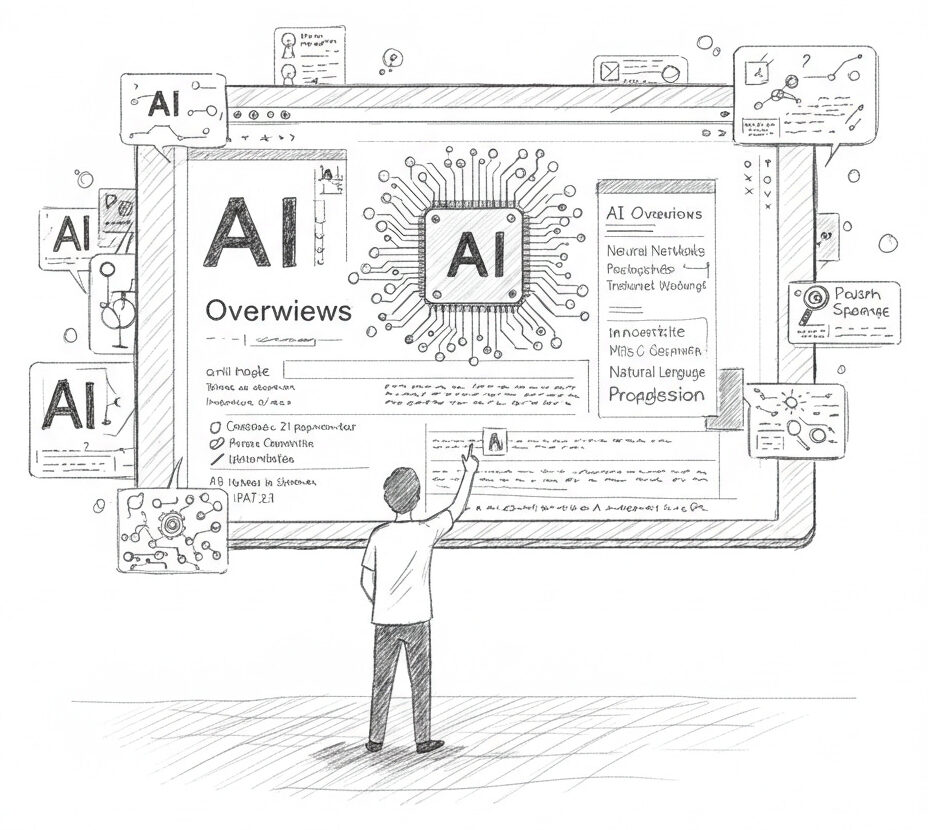 Image Credit: Lyna ™
Image Credit: Lyna ™My goal is to provide a “meta-analysis”: In (medical) research, a meta-analysis is a statistical method where researchers combine data from multiple independent studies on the same topic to produce a single, more robust conclusion about the overall effect, providing a more comprehensive picture than any individual study alone could offer.
Essentially, it’s a “study of studies” that analyzes and summarizes results from various research papers to identify trends and patterns across the data.
I always preach that “we need more data” to form stronger convictions. Now, we have more. Let’s form.
The Studies
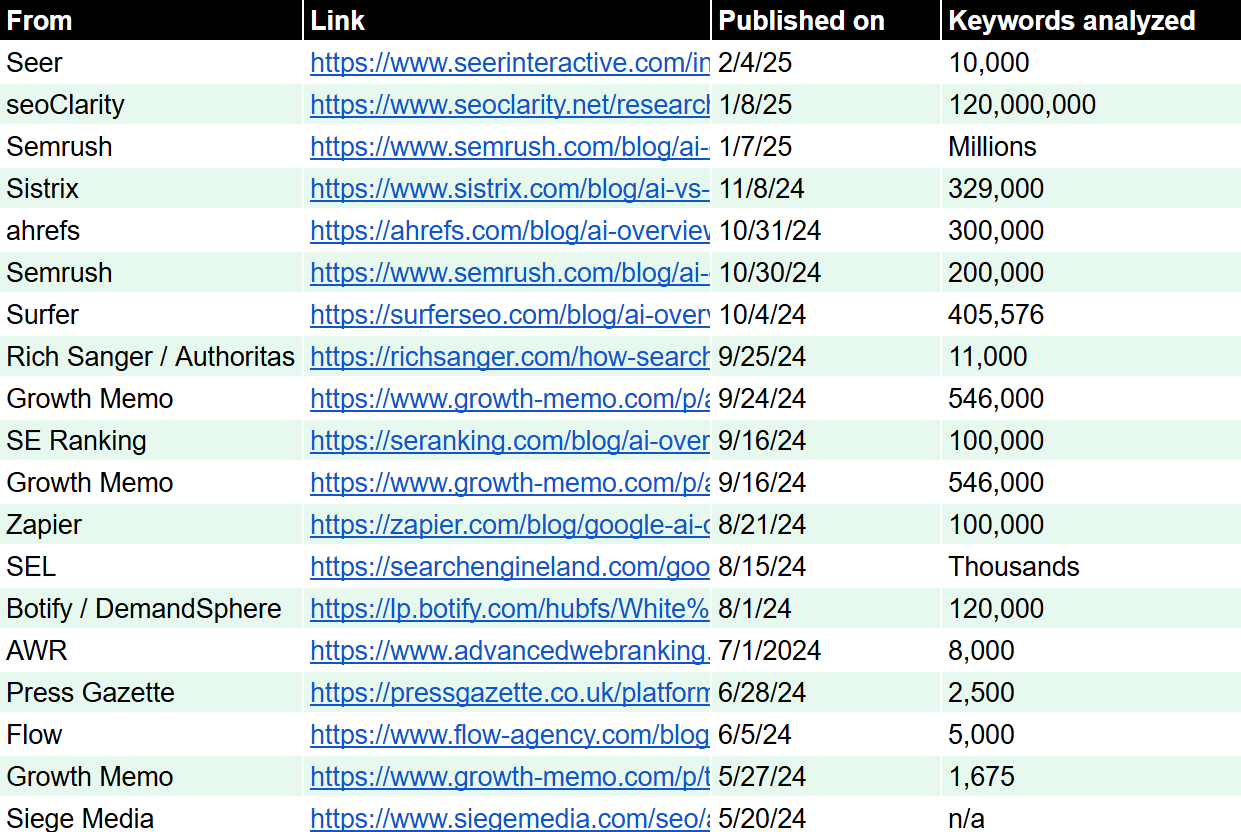 Image Credit: Kevin Indig
Image Credit: Kevin IndigGet the spreadsheet with sample sizes and publish dates: Sheet.
- Google AIO Impact – SEO & PPC CTRs at all time low
- AI Overviews: What Are They & How Do They Affect SEO?
- AI Overviews Study: Inside Google’s New Search Reality
- I Analyzed 300K Keywords. Here’s What I Learned About AI Overviews
- We Studied 200,000 AI Overviews: Here’s What We Learned
- Google AI Overviews Study: 25+ Statistics from 405,576 searches
- Search Intent and AI Overviews: Study Insights
- AI on Innovation – Part 2
- AI Overviews Research: Google Ads in the AIO-inclusive SERPs
- AI on Innovation – Part 1
- How Google AI Overview impacts 20 industries
- Publishers report ‘negligible’ traffic impact of Google AI Overviews
- Impact of Google’s AI Overviews: SEO Research Study
- AI Overview Study for 8,000 Keywords in Google Search
- The Traffic Impact of AI Overviews
- AI Overviews SEO Impact Report [New Data]
- ‘Devastating’ potential impact of Google AI Overviews on publisher visibility revealed
- AI Overview Trends: Insights from 5,000 HR and Workforce Management Keywords for SaaS
- AI vs. SEO: What does the Future of Search look like?
How Often Does Google Show AI Overviews?
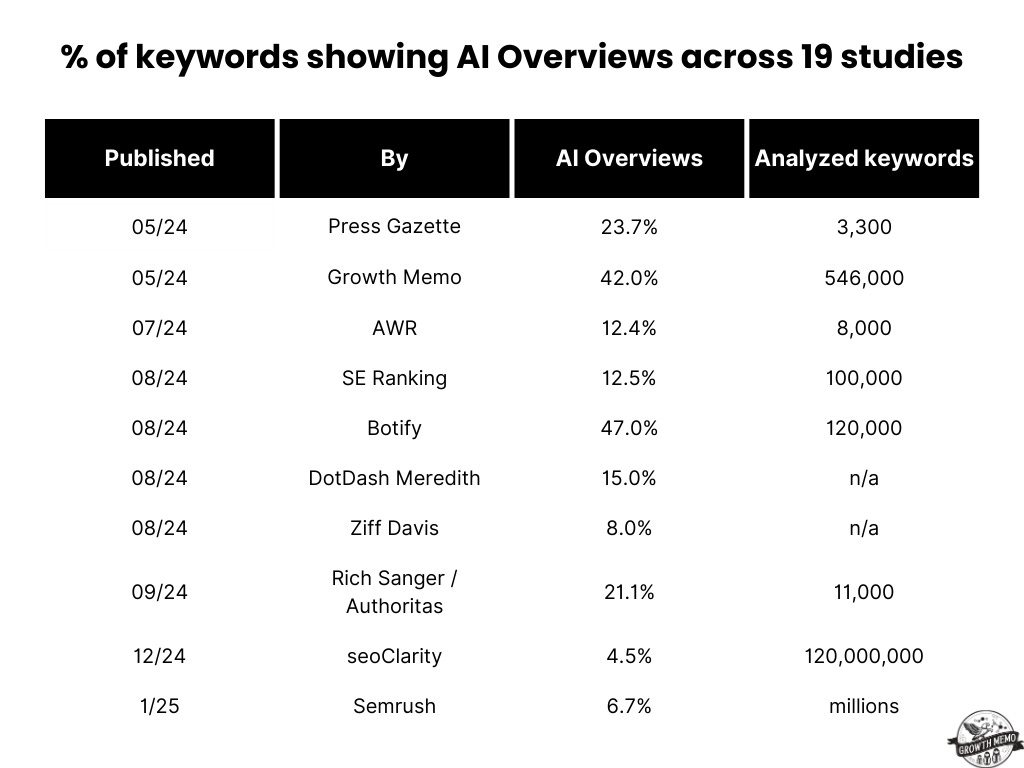 Image Credit: Kevin Indig
Image Credit: Kevin IndigThe biggest question, of course, is, “How much does this matter”? To my surprise, the AIO-pocalypse has not yet happened. At least not according to the data.
How many keywords show AIOs in the respective studies:
- Press Gazette, 05/24: 23.7% out of 3,300 news keywords (US). [17]
- Growth Memo, 05/24: 42% of 546,000 queries. [15]
- AWR, 07/24: 12.4% of 8,000 keywords. [14]
- SE Ranking, 08/24: 12.47% of 100,000 keywords. [9]
- Botify, 08/24: 47% of 120,000 keywords. [3]
- DotDash Meredith, 08/24: 15% “of searches across our categories.”
- Ziff Davis, 08/24: “8% of most important queries”. [12]
- Rich Sanger / Authoritas, 09/24: 21.1% of 11,000 keywords. [7]
- seoClarity, 12/24: 4.5% of 120 million keywords. [13]
- Semrush, 01/25: 6.7% across millions of keywords. [5]
The coverage varies very much by industry.
Industry Distribution
Press Gazette, 05/24: [17]
- Horoscopes: 62%
- Health: 55%
- Geo locations: 47%
- Shopping: 43%
- Media & Tech: 36%
AWR, 08/24: [14]
- Health: 67.5%
- Safety: 46.1%
- Technology: 23%
- SEO: 17%
- Finance: 17%
Zapier, 08/24: [11]
- Relationships: 40.6%
- Food & Beverage: 23.6%
- Business: 18.5%
- Technology: 17.2%
- Wellness: 15.6%
SE Ranking, 08/24: [9]
- Relationships: 46.1%
- Food & Beverage: 33.5%
- Business: 23.4%
DotDash Meredith, 08/24: [12]
- Health
- Technology
- Finance
Semrush, 01/25: [5]
- Health: 23.0%
- Science: 20.1%
- Internet & Telecom: 11.7%
- Travel: 10.0%
- Computers & Electronics: 8.75%
Implications:
- AI Overviews came hot out of the beta gate on May 14, 2024. Since then, we’re seeing fewer keywords showing AI Overviews – not more. That’s counterintuitive to me. And a bit counter to my personal experience when using Search. But that’s the data.
- The latest studies share numbers between 4.5 and 6.7% compared to early studies that found 12.5 – 42%. It seems that the TsunAImi I was worried about hasn’t materialized itself yet, and there are still plenty of non-AIO keywords left that can deliver meaningful organic traffic. However, I wonder how well we really track the longtail keywords that show AIOs (more in a moment).
- It’s also noteworthy that Semrush [3] found significant differences between mobile and desktop AI Overviews: The most populated industries on the desktop are health, people and society, and science, while mobile shows most AIOs for people and society, science, and food & drink.
- YMYL industries like health show the most AIOs. And I just don’t understand why. If I were Google and launched LLM answers that are prone to hallucination, I’d start in a space where it’s less consequential, like people and society or entertainment. To be fair, some studies show that Google invests in those “lightweight” verticals. But health comes up most consistently at the top. I assume that Google has a lot of medical studies that it uses to ground health-related AI Overviews.
What Triggers AI Overviews?
The common theory is that AIOs disrupt predominantly informational searches, and the data backs that up.
Search intent is important because, theoretically, even a low percentage of keywords showing AI Overviews could have a big impact if those keywords are important for business and influence purchase decisions.
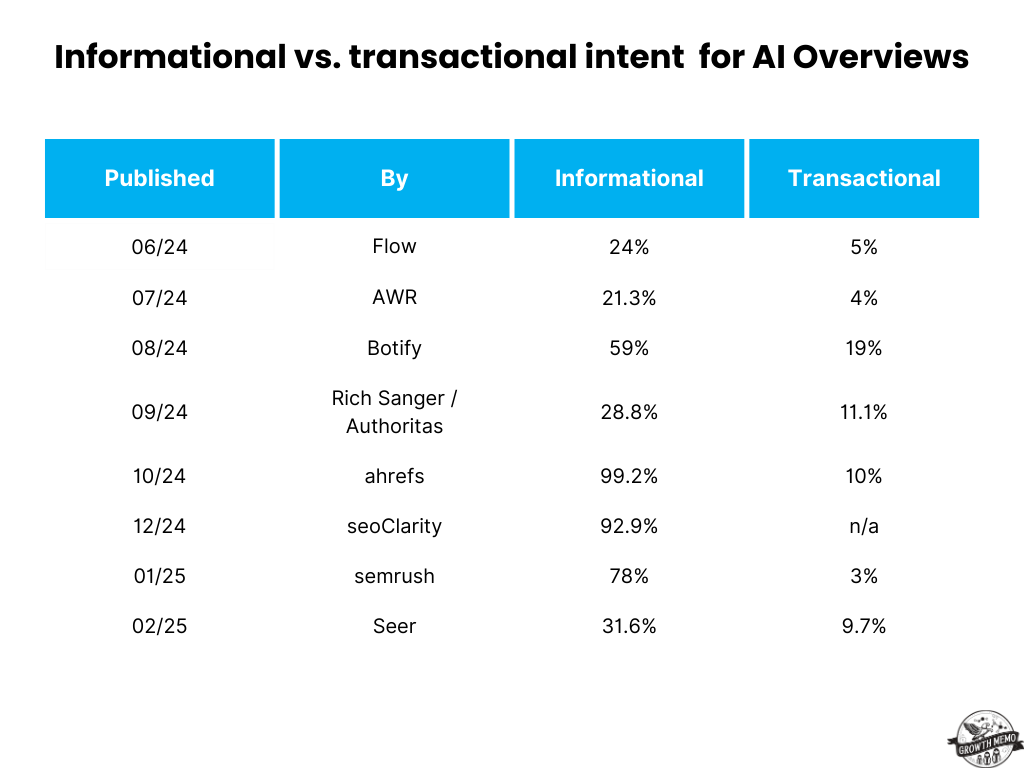 Image Credit: Kevin Indig
Image Credit: Kevin IndigEvery study I looked at confirmed that the majority of AI Overviews show up for informational-intent keywords like questions:
- Flow, 06/24: 24% of AIOs show up for top-of-the-funnel and 5% for bottom-of-the-funnel keywords. [18]
- AWR, 07/24: 34.7% of queries showing an AOI include the question word “how.” 21.3% of AIOs show up for informational keywords, compared to 4% for commercial/transactional. [14]
- Botify, 08/24: 59% of informational keywords trigger an AIO, compared to 19% of commercial keywords. [3]
- Rich Sanger / Authoritas, 09/24: 28.8% of keywords showing an AIO are informational compared to 11.1% commercial/transactional. [7]
- Ahrefs, 10/24: 99.2% of information keywords trigger an AIO compared to 10% of commercial/transactional keywords. [4]
- seoClarity, 12/24: 92.9% of keywords showing an AIO have informational intent. [13]
- Semrush, 01/25: 80% of desktop and 76% of mobile AIOs targeted informational keywords. 35% of desktop and 32% of mobile keywords were questions. Transactional keywords showed AIOs only 3% of the time. [5]
- Seer, 02/25: 31.6% of keywords showing an AIO are questions compared to 9.7% without an AIO. [1]
User intent is tightly connected to query length. The longer, the easier it is to gauge what a searcher wants. And the lower the search volume.
Longtail Vs. Shorthead
Longer queries are more likely to trigger AIOs:
- AWR, 07/24: Queries with five words (long-tail) trigger AIOs 22.6% of the time compared to one with 0.9% and 10-word queries with 0.2%.
- Botify, 08/24: 73.6% of long-tail queries (+5 terms) trigger an AIO, compared to 8.9% for short-head queries. Also, 55% of queries < 1,000 monthly searches show an AIO. [3]
- Ahrefs, 10/24: Long-tail keywords are more likely to trigger AIOs than shorthead keywords. Search volume for keywords showing AIOs is 193x smaller than for keywords not showing AIOs. [4]
- Semrush, 01/25: 82% of desktop and 76% of mobile AIOs occurred for keywords with less than 1,000 monthly searches. [5]
- Seer, 02/‘25: The average query length leading to an AI Overview was 4.29 words compared to 3.48 words for a query not presenting an AIO. [1]
Maybe not a trigger, but a strong co-occurrence exists between AIOs and SERP Features.
Featured Snippets
Featured Snippets and AI Overviews tend to show up together:
- AWR, 07/24: AI Overviews appear alongside Featured Snippets in 59.5% of keywords. [14]
- Botify, 08/24: Featured Snippets and AIOs co-occur 60% of the time and cover 67-76% of your screen, depending on the device. [3]
- Ahrefs, 10/24: Featured Snippets appear for 65.5% of keywords showing an AIO. Google is much less likely to show Knowledge Panels and videos when AIOs are present, probably because the Knowledge Graph is the foundation for AIO generation. [4]
Paid Search Results
Google seems to shy away from showing PPC ads when AIOs are present:
- SE Ranking, 08/24: 13.5% of AIOs show up next to ads on desktop. [9]
- Semrush, 01/25: 5% of keywords showing AIOs also showed PPC ads. [5]
- Seer, 02/25: Paid Search CTRs dropped across the board – with or without an AIO, but they were lower comparatively when Google shows AIOs. [1]
Implications:
- If there is SEO traffic to be lost (getting to that shortly), it’s mostly for informational searches, as we can also see the fact that Featured Snippets tend to show up with AIOs. Commercial and transactional keywords don’t show a high rate of AI Overviews, maybe because that’s where ads show up the most, and Google doesn’t want to kill its click-through rates.
- On the other hand, Google’s Knowledge Graph does often show up with AIOs. Why? Most likely because the Knowledge Graph is the foundation for Google’s AIOs and doesn’t provide net value in the search results. As a result, you should check whether your brand has a knowledge graph and what entities Google associates it with. It could impact how you should up in AIOs.1
- AI Overviews are more likely to show up for longer queries with lower search volume. Makes sense as AIOs answer long questions so much better than classic search results (Google never really figured longtail search out), and longer queries are searched by fewer people because they’re more specific.
How Do AI Overviews Impact Click-Through Rates And SEO Traffic?
We know that AIOs might not show up as often now as they did fresh out of the egg. They occur for informational longtail queries with lower search volume. But when they show up, what’s their impact?
AIOs push organic results down significantly:
- Press Gazette, 05/24: On average, organic search results dropped by -980 pixels when AIOs were present. In the shopping vertical, the average was 1,205! Keep in mind that the data was gathered just when AI Overviews first rolled out. Things could and likely do look very different now. [17]
- AWR, 07/24: The average AIO is 912 pixels long. [14]
- Botify, 08/24: AI Overviews take up 42% of the screen on desktop and 48% on mobile. [3]
- Rich Sanger / Authoritas, 09/24: AI Overviews push organic results down by an average of 202 pixels. [7]
- The fact that AI Overviews occupy so much screen real estate alone hurts the CTR for organic results.
Organic Click-Through Rates
AIOs shrink CTRs and SEO traffic. Some industries that target high-intent keywords report a smaller impact than others:
- Growth Memo, 05/24: A negative impact of -8.9% on click-through rates on average. [15]
- Siege Media, 05/24: 3% increase in CTR after AIOs went live. [16]
- DotDash Meredith, 08/24: minimal differences in CTR between search results with and without AI Overviews. [12]
- Sistrix, 11/24: Prominent citations in AI Overviews lead to more clicks than Featured Snippets, but still much less compared to classic organic results. [19]
- Seer, 02/25: AIOs cut organic CTRs in less than half and tend to show up for queries that already got fewer clicks before (zero-click searches). When cited, sites get more traffic, and average CTR grows from 0.74% to 1.02%. [1]
Being cited matters, but how much room is there to win in citations?
Number Of Citations
Since we know being cited in AIOs matters for organic traffic, the next question is how much “real estate” there is, and the answer seems to be 5-8:
- AWR, 07/24: AI Overviews contain 7.2 citations on average. [14]
- Rich Sanger / Authoritas, 09/24: The average number of citations is 8.2, with small variations across user intent. [7]
- Surfer, 10/24: Google cites eight or fewer sources 90% of the time, with five on average. 99% of sources are only cited once. [6]
Implications:
- AIOs have a negative impact on CTRs. Intuition validated. “Ranking in AIOs,” a.k.a. being cited, should be the new goal in SEO when they’re shown in the SERPs.
- The data validates that informational searches are dwindling in SEO value. So, theoretically, we should see a lot more companies losing organic traffic, though not necessarily revenue from organic traffic. But that doesn’t seem to be the case, at least not to the intensity I expected. A possible reason could be that organic CTRs were already low for queries that show AI Overviews, as the Seer study shows. Maybe the negative impact of AIOs is a continuation of a trend that has already existed for years, which is Google answering more questions in the SERPs.
- What’s still unclear is if and when searchers click on organic results below AI Overviews and citations. I assume that user intent is also the deciding factor here, but we need more data.
How Can You Rank In AI Overviews?
When we talk about “ranking in AIOs,” we mean being cited. There is a lot more to be discovered about how Google decides what pages to cite.
Based on patents, it seems that Gemini first creates the answer to a question and then seeks sources that could be a good fit, though I’m not sure why it doesn’t simply ground the answer in the top results.
Based on the data so far, we can agree on the following citation factors:
It’s Not Keyword Match
The number of AIOs citing the exact keyword is extremely low:
- Botify, 08/24: Text (Cosine) similarity between the AIO and cited pages shows a strong relationship, meaning the closer your text matches what’s shown in the AIOs, the higher your chances to be cited. [3]
- Surfer, 10/24: Only 5.4% of AI Overviews contain the exact search query. [6]
But your position matters as well.
Organic Ranking Position Matters Somewhat
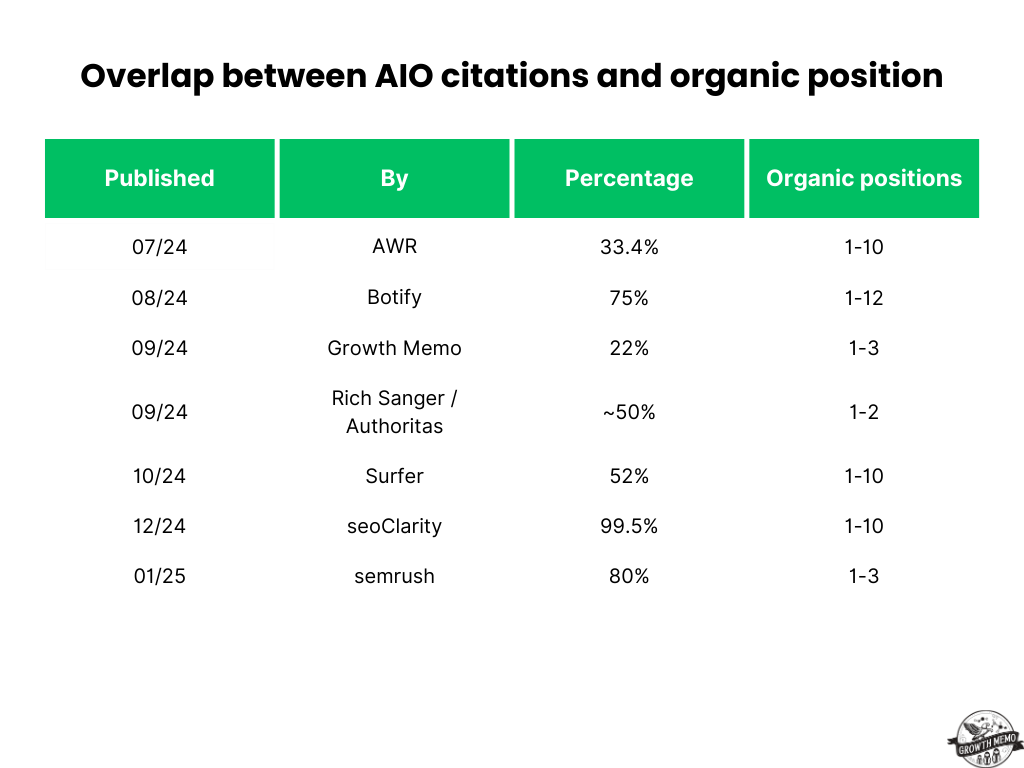 Image Credit: Kevin Indig
Image Credit: Kevin IndigRanking higher is better but not a requirement to get traffic from AIOs:
- AWR, 07/24: 33.4% of AIOs cite pages that rank in the top 10 positions. [14]
- Botify, 08/24: 75% of cited websites rank in the top 12 positions, but the median rank is 4. [3]
- Growth Memo, 09/24: 40% of AIO sources rank in positions 11-20 and only 22% in positions 1-3. [8]
- Rich Sanger / Authoritas, 09/24: The top two positions are included in citations 47.8 – 53.8% of the time. [7]
- Surfer, 10/24: 52% of cited sources rank in the top 10 results. [6]
- seoClarity, 12/24: AIOs cited the top 10 positions 99.5% of the time, and 80% of AIOs cite a page that ranks in the top 3 organic positions. [13]
- Semrush, 01/25: The overlap between AIO citations and organic search results is only 20-26%. Over 50% of AI Overviews on desktop and 60% on mobile did not link to the top organic result. [5]
Implications:
- Today, AI Overviews cite more pages in the top 10 ranking positions than when they initially launched.
- The best thing you can do to target AIOs is to run a Cosine similarity analysis between your text and the AIO. Pick the page that ranks best for the target keyword and check which parts of the AIO it could give the best answer to.
- Of course, strong technical fundamentals and good on-page SEO matter, but more to have a high ranking position and increase your chances to be picked as a citation rather than as a hard criterion AIOs evaluate.
How Should You Rethink Content Creation For AI Overviews?
Optimizing for AIO citations and mentions isn’t a 180-degree turn compared to classic organic results, but you want to keep in mind the right format and where you publish the content.
AIO Length
The average AI Overview is around 90-170 characters:
- AWR, 07/24: The average AIO is 169 words long. [14]
- Botify, 08/24: The average AI Overview is 169 words and 912 pixels long. [3]
- Surfer, 10/24: AI Overviews are, on average, 157 words long, with 99% being shorter than 328. Featured Snippets average ~50 words. [6]
- Semrush, 01/25: 90 (mobile) to 119 words (desktop). [5]
AIO Format
Most AIOs contain lists:
- AWR, 07/24: 40% of AIOs are lists, 24% are paragraphs, and only a few have images. [14]
- Surfer, 10/24: 61% of AI Overviews are unordered lists, 21% contain no list, 12% are ordered lists, and 6% are ordered and unordered lists. [6]
Prominently Cited Domains
Youtube sticks out as the domain with the most citations:
- Rich Sanger / Authoritas, 09/24: YouTube and Wikipedia are cited most often in AIOs for information intent keywords. [7]
- Growth Memo, 09/24: The most cited domains are YouTube, Wikipedia, and Google, which often rank in lower positions. [10]
Implications:
- 90-170 characters equal roughly 15-40 words on average – not a lot! So optimizing your content for AIOs really seems to be about straightforward answers, no fluff, and a high degree of insight. Similar to optimizing for Featured Snippets, it seems AIO optimization is about tweaking small parts of an article over and over until you get the citation.
- The outsized impact of YouTube on AIOs pushes content generation further away from websites. I also found that LinkedIn is cited a lot in my research. So, social and content platforms could be part of modern SEO. At the very least, run tests on YouTube and LinkedIn.
Bottom Line
As a community, we’ve made significant progress in understanding AI Overviews and their impact.
Even though it’s a moving target, we can conclude for now that AIOs occupy informational, long-tail queries with low search volume and negatively impact click-through rates unless you’re part of the citations.
I hope to write a follow-up meta-analysis with new studies in about a year and be able to answer questions like:
- How often do AI Overviews change?
- How does Google decide which products to list in ecommerce AIOs?
- What are sites doing at scale to get more AIO citations over time?
- What new AIO formats is Google testing, and how are they different?
- How do AIOs vary between countries for the same query?
Stay tuned for next week when I publish my meta-analysis of AI Chatbots like ChatGPT or Perplexity and their impact on Search.
I also plan to publish at least three more original data studies about AI Overviews this year. Subscribe to stay up to date!
1 AI Overviews and your website
Featured Image: Paulo Bobita/Search Engine Journal
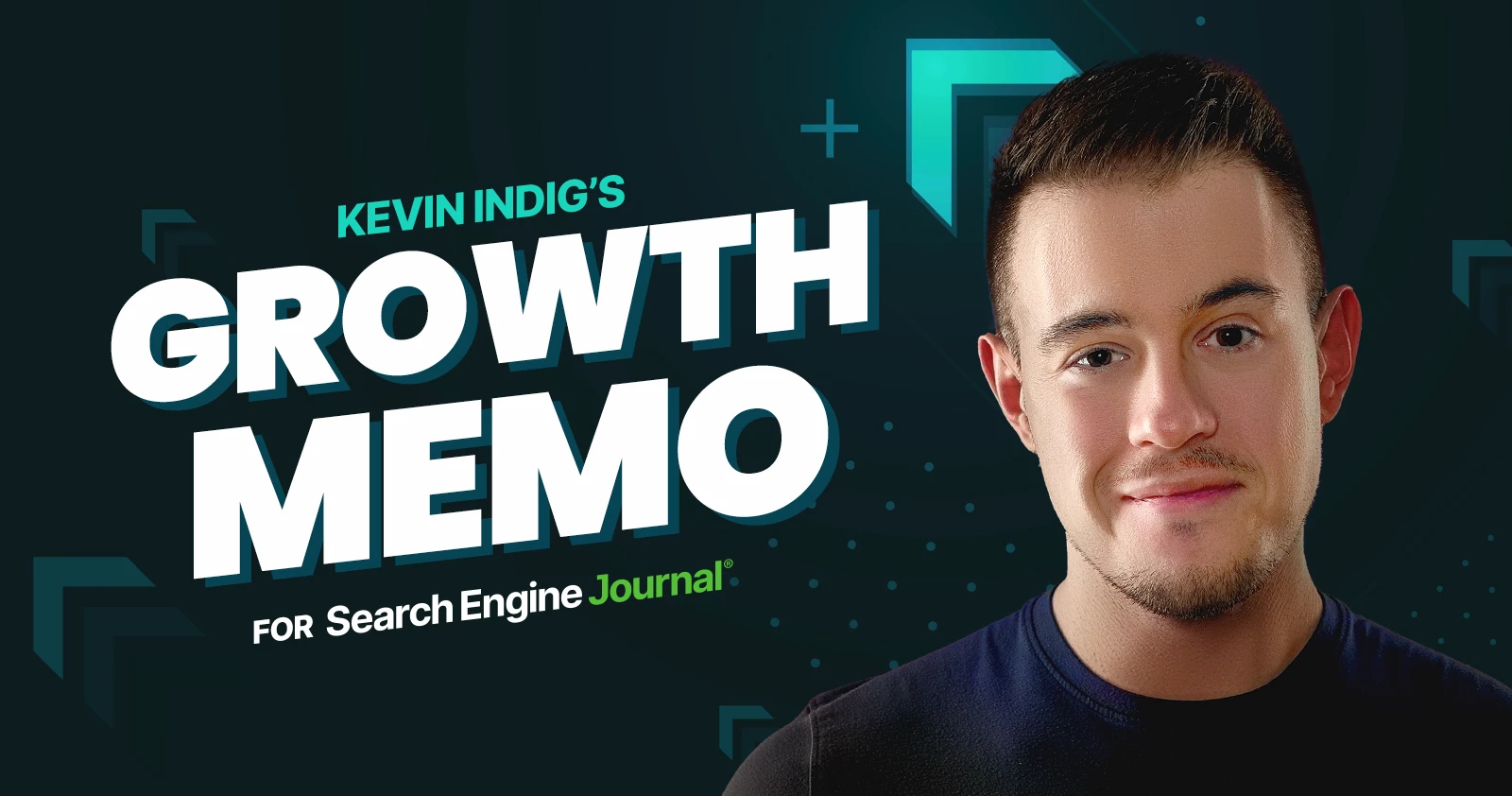

 Image Credit: Lyna ™
Image Credit: Lyna ™ Image Credit: Kevin Indig
Image Credit: Kevin Indig Image Credit: Kevin Indig
Image Credit: Kevin Indig Image Credit: Kevin Indig
Image Credit: Kevin Indig Image Credit: Kevin Indig
Image Credit: Kevin Indig